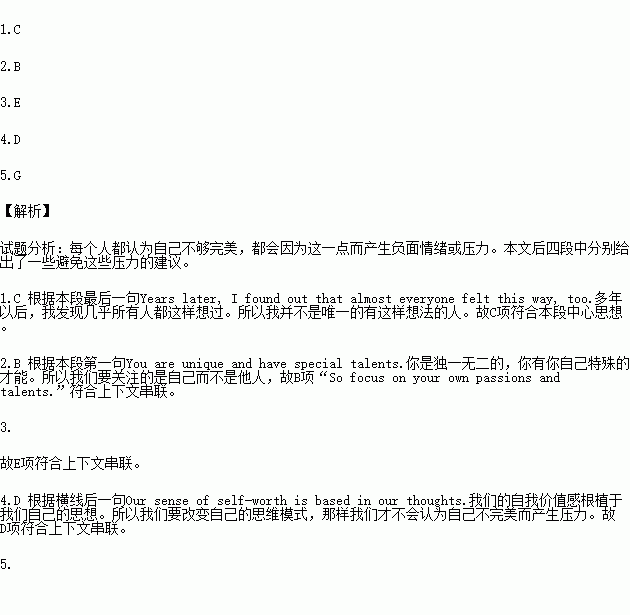题目内容
根据短文内容,从短文后的七个选项中选出能填人空白处的最佳选项。选项中有两项为多余选项。
We all go through times when we feel we are not good enough. We might feel that way at work or in school or even as a parent. Here are some things to remember when you feel like that.
1. —1.—. When I started my Ph.D. program, I felt like the dumbest person in every class. I couldn’t believe how many smart people were there. I didn’t know if I could measure up to their intelligence or compete in the same league with them. Years later, I found out that almost everyone felt this way, too.
2. You are unique and have special talents. If you can barely make Hamburger Helper, don’t compare yourself to your sister who is a chef(厨师). I’m sure you can do many things that she can’t. —2.—. You are you. You are not your sister.
3. You need to stop chasing perfection. It doesn’t exist. —3.—. So if you think that there is some objective measurement of perfection and that the rest of the world is judging you against, then you are wrong. Most people are too worried about their own lack of perfection to judge you.
4. —4.—. Our sense of self-worth is based in our thoughts. We have been programmed for many years with thoughts about ourselves. Messages come from our parents, our peers, teachers, the media and our own labels. But guess what? They are only thoughts. Just because you think these thoughts, it doesn’t make them true. —5.—.
A. You have the power to change your future.
B. So focus on your own passions and talents.
C. You are not the only one who feels this way.
D. You need to change your thought patterns.
E. What’s perfect to me is not perfect to you.
F. If you love yourself for who you are, other people will notice.
G. One of my favorite sayings is, “Don’t believe a negative thought you think!”
假定你是我校高三学生李华,在学校看到如下通知,请根据通知的内容和写作要点向学校写一封申请信:
HOST FAMILIES WANTED Teachers and students from Central High School phoenix will visit our school two weeks later. Host families are wanted to accommodate our friends. REQUIREMENTS: ◇ Can communicate in English. ◇ A SEPARATE room is a MUST. ◇ A private car is preferred. If interested, please send your APPLICATION IN ENGLISH to the Office of the principal before THURSDAY. Please consult us for any further information. |
写作要点:
1.你对参与该活动的认识;
2.你的优势;
3.作为接待家庭的打算。
注意:
1.可根据内容要点适当增加细节,以使行文连贯;
2.词数120字左右。
Dear Sir or Madam,
I am Li Hua from Class One, Senior Three. ________________________________________
_______________________________________________________________________________
_______________________________________________________________________________
_______________________________________________________________________________
_______________________________________________________________________________
_______________________________________________________________________________
_______________________________________________________________________________
_______________________________________________________________________________
Yours sincerely,
Li Hua

